A Russian court is due to deliver a verdict in the case against opposition figure Vladimir Kara-Murza, who is being tried for treason for his criticism of the Ukraine offensive.
His high-profile trial is the latest in a string of cases against opposition voices in Russia in a crackdown that has intensified since the start of the war in Ukraine.
AFP reports:
Kara-Murza, 41, is accused of treason, spreading “false” information about the Russian army and being affiliated with an “undesirable organisation”.
Prosecutors have called for Kara-Murza to be sentenced to 25 years in jail.
In his last words in court following a closed-door trial, Kara-Murza said he stood by his political statements, including against Russia’s offensive in Ukraine.
“I subscribe to every word that I have said, that I am incriminated for today,” Kara-Murza said in comments published by journalist Alexei Venediktov.
“Not only do I not repent for any of it – I am proud of it,” he added.
Kara-Murza was detained in April last year on charges of spreading what the authorities consider false information about the Russian army over an address to members of the lower house of the Arizona legislature last March.
In August 2022, Kara-Murza was accused of being affiliated with an “undesirable organisation” for participating in a conference in support of political prisoners.
Then in October he was charged with treason over remarks critical of Moscow made at three public events abroad, his lawyer told state-run TASS news agency.
The opposition activist suffers from a nerve condition called polyneuropathy which his lawyers say was due to two poisoning attempts in 2015 and 2017.
The condition has worsened in prison, and he was too unwell to attend some of his hearings, his lawyers said.
Key events
The UK’s Ministry of Defence has issued its daily intelligence briefing about the situation in Ukraine. This morning it has concentrated on the consequences of mining in the country, claiming that “over 750 mine related casualties among civilians have been reported since the start of the invasion” and that “it will likely take at least a decade to clear Ukraine of mines.”
Most of Ukraine’s 41-million-strong population are Orthodox Christians and they celebrated Easter Sunday yesterday. Here are a few pictures from around the country:
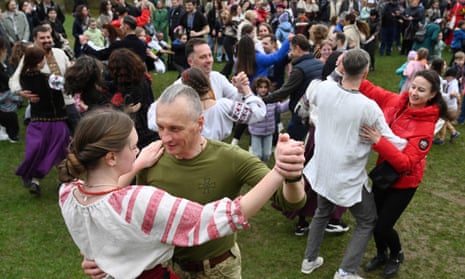
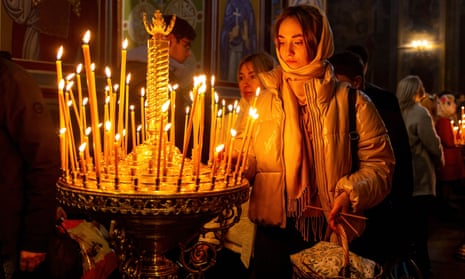
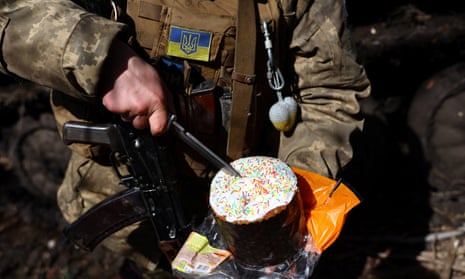
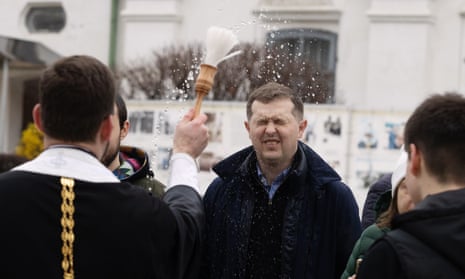
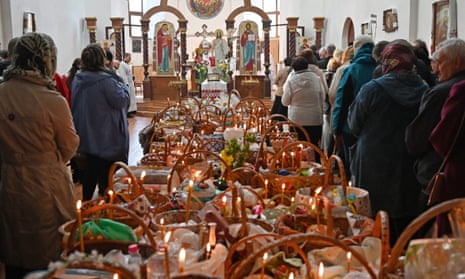
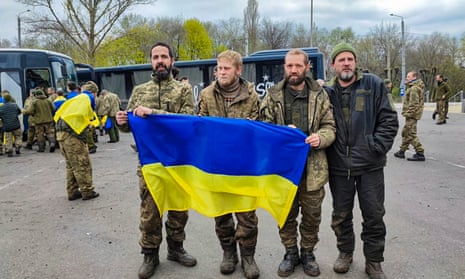
Russian military command appears to be increasingly shifting responsibility for offensive operations in Ukraine to the Russian Airborne troops (VDV), the Institute for the Study of War (ISW) has said in its latest update.
The US thinktank made the claim based on reports that VDV commander Col Gen Mikhail Teplinsky has returned to a “major” but unspecified role in Ukraine after the Russian MoD allegedly replaced him in January following a dispute with the chief of the Russian general staff, Valery Gerasimov.
His appointment further suggests that the Russian MoD wants to work more closely with the mercenary group Wagner in order to complete the capture of the embattled eastern city of Bakhmut, the ISW writes. Wagner Group financier Yevgeny Prigozhin had supported Teplinsky at the time of his dismissal in January.
The ISW writes further:
The Russian MoD and Prigozhin publicly acknowledged on April 11 that VDV elements are engaged in the Bakhmut area and holding Wagner’s flanks north and south of Bakhmut while Wagner pursues the main offensive effort in the city itself.
ISW has recently observed that elements of the 106th VDV division are operating in the Bakhmut area. Prigozhin has also scaled down his explicit rhetorical attacks on the MoD in recent days.
Russian milbloggers have reported that Wagner forces are operating T-90 tanks within Bakhmut, suggesting that Russian leadership has allocated more modern assets to Wagner in their efforts to take the city.
Teplinsky’s reappointment is therefore likely also an attempt by the Russian MoD to posture itself better to work with Wagner to finish the task of taking Bakhmut.
Iran has sentenced 10 members of the armed forces to prison after finding them guilty of involvement in the 2020 downing of a Ukrainian airliner.
Iranian forces shot down Ukraine International Airlines flight PS752 shortly after its takeoff from Tehran on January 8, 2020, killing all 176 people on board. Most were Iranians and Canadians, including many dual nationals.
AFP reports:
According to the judiciary’s Mizan Online website, a commander received the heaviest penalty of 10 years in prison for having defied orders in shooting down the plane.
Nine other personnel were sentenced to between one and three years, Mizan reported.
The commander of a Tor M-1 surface-to-air missile system “fired two missiles” at the airliner “contrary to orders” and without obtaining authorisation, Mizan said.
It did not identify any of the accused.
Three days after the Kyiv-bound plane was shot down, the Iranian armed forces admitted there had been a “mistake”.
“Given the extent of the effects and consequences of this action, the main defendant was sentenced to the maximum penalty,” Mizan Online added on Sunday, without giving further details.
Tensions between Iran and the United States had been soaring at the time the airliner was shot down.
Iranian air defences were on high alert for a US counterattack after Tehran fired missiles at a military base in Iraq that was used by American forces.
Those missiles came in response to the killing in a US drone attack in Baghdad of Major General Qassem Soleimani who headed the foreign operations arm of Iran‘s Revolutionary Guard Corps.
Ukraine lost 11 citizens in the airline disaster.
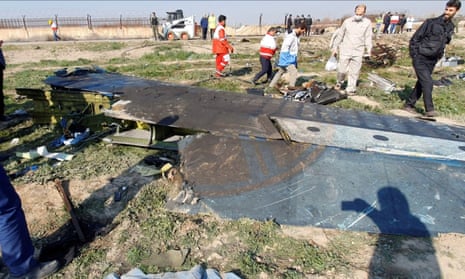
Vladimir Putin and China’s defence minister Li Shangfu have vowed to deepen military cooperation between China and Russia after the men met in Moscow over the weekend.
Li, who met the Russian president on Sunday on his first trip overseas in the role, said China was willing to work with Russia to have close strategic communications between their militaries.
He said China was prepared to strengthen multilateral coordination and cooperation with Russia, according to state-run CCTV news.
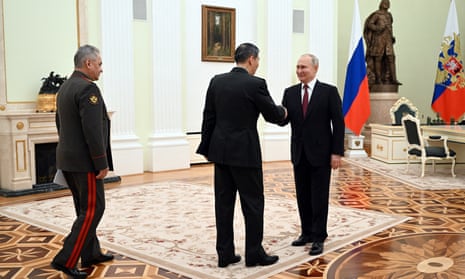
“China is willing to work with Russia to make new contributions to the maintenance of world and regional security and stability,” Li said, according to the report.
He said ties between Russia and China “surpass the military-political alliances of the cold war era”, in translated remarks broadcast on Russian TV.
“This is my first overseas visit since taking over as China’s defence minister. I specifically chose Russia for this in order to emphasise the special nature and strategic importance of our bilateral ties,” Li said.
For more on this story, read our full report:
A Russian court is due to deliver a verdict in the case against opposition figure Vladimir Kara-Murza, who is being tried for treason for his criticism of the Ukraine offensive.
His high-profile trial is the latest in a string of cases against opposition voices in Russia in a crackdown that has intensified since the start of the war in Ukraine.
AFP reports:
Kara-Murza, 41, is accused of treason, spreading “false” information about the Russian army and being affiliated with an “undesirable organisation”.
Prosecutors have called for Kara-Murza to be sentenced to 25 years in jail.
In his last words in court following a closed-door trial, Kara-Murza said he stood by his political statements, including against Russia’s offensive in Ukraine.
“I subscribe to every word that I have said, that I am incriminated for today,” Kara-Murza said in comments published by journalist Alexei Venediktov.
“Not only do I not repent for any of it – I am proud of it,” he added.
Kara-Murza was detained in April last year on charges of spreading what the authorities consider false information about the Russian army over an address to members of the lower house of the Arizona legislature last March.
In August 2022, Kara-Murza was accused of being affiliated with an “undesirable organisation” for participating in a conference in support of political prisoners.
Then in October he was charged with treason over remarks critical of Moscow made at three public events abroad, his lawyer told state-run TASS news agency.
The opposition activist suffers from a nerve condition called polyneuropathy which his lawyers say was due to two poisoning attempts in 2015 and 2017.
The condition has worsened in prison, and he was too unwell to attend some of his hearings, his lawyers said.
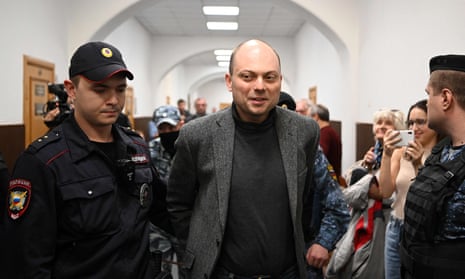
Opening summary
Hello and welcome to the Guardian’s live coverage of the war in Ukraine with me, Helen Livingstone. Our top story today:
A Russian court is due to deliver a verdict in the case against opposition figure Vladimir Kara-Murza, who is being tried for treason for his criticism of the war in Ukraine.
The 41-year-old is accused of spreading “false” information about the Russian army and being affiliated with an “undesirable organisation”. He faces 25 years if convicted but in his closing statement to the court following a closed-door trial last week, he said he stood by what he had said.
“Not only do I not repent for any of it – I am proud of it,” he said in a statement that was distributed by his wife and lawyer.
Meanwhile after a meeting with China’s defence minister, Li Shangfu, in Moscow, Russian president Vladimir Putin said the two countries were “working actively through our military departments” and regularly exchanging “useful information”. Li said ties between the two countries had “already entered a new era” and surpassed “the military-political alliances of the cold war era”.
Other key developments:
-
A row is brewing over Poland and Hungary’s decision to ban grain imports from Ukraine to protect their own agricultural sectors. Reuters reports that a European Commission spokesperson said unilateral action on trade by European Union member states was “not acceptable”.
-
Following Poland and Hungary’s decision, Bulgaria is considering a similar move. Local news agency BTA reported that the agriculture minister, Yavor Gechev, said the country was mulling over a ban on Ukrainian grain imports.
-
Ukrainian and Russian armed forces are fighting extraordinarily bloody battles in the ruined eastern city of Bakhmut, but pro-Kyiv forces are still holding on, Ukraine’s military has said. Russia said that Wagner mercenary units supported by airborne troops had captured two more city blocks.
-
One hundred and thirty Ukrainian prisoners of war have been released and returned home in a “great Easter exchange”, a senior Ukrainian presidential official has said. It was not clear how many Russians were sent back the other way.
-
A Russian official has claimed four people were killed and 10 injured in Ukrainian shelling of a town in Russian-controlled Donetsk. Denis Pushilin said a seven-year-old girl was among those wounded in Yasynuvata.
-
Russia has been using drones to attack Ukrainian police in Kherson, according to the region’s police force. It said a police car was attacked in the Korabel area, injuring two officers and damaging the car, while in Beryslav one officer was injured and cars damaged.
-
A new international economic support package of $115bn (£93bn) is giving Ukraine more confidence it can prevail against Russian forces amid growing recognition the war could continue for longer than expected, the Ukrainian finance minister said on Saturday. Serhiy Marchenko said Group of Seven (G7) finance ministers assured him during International Monetary Fund and World Bank meetings in Washington this week that they would support Ukraine for as long as needed.
-
Volodymyr Zelenskiy spoke to the French president, Emmanuel Macron, on Saturday. In two tweets, the Ukrainian president said they had discussed Macron’s recent visit to Beijing to meet China’s president, Xi Jinping.
-
The Ukrainian foreign minister, Dmytro Kuleba, will visit Baghdad on Monday, his first trip to Iraq since Russia invaded Ukraine. Kuleba is expected to hold talks with the Iraqi prime minister, Mohammed Shia al-Sudani, and the foreign minister, Fuad Hussein.
-
The Brazilian president, Luiz Inácio Lula da Silva, has called for the establishment of a group of countries that are not involved in the Russia-Ukraine war in order to broker peace. Lula, who has criticised the role of the US and the EU in the conflict, spoke of attempting to gather a group of leaders who “prefer to talk about peace rather than war”, citing China’s Xi Jinping and the president of the United Arab Emirates, sheikh Mohamed bin Zayed al-Nahyan, both of whom he met this week.

